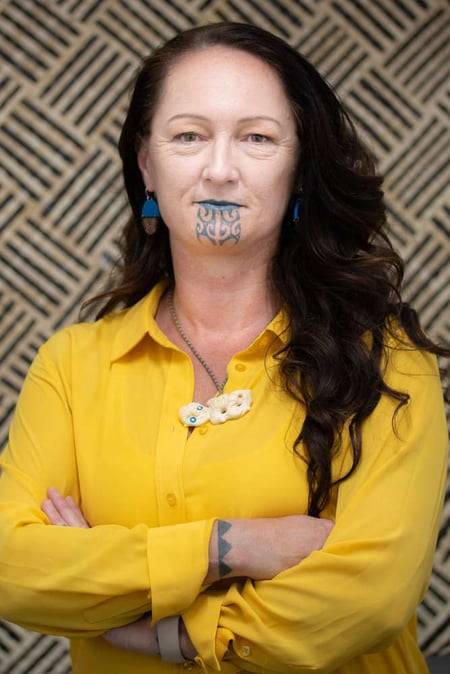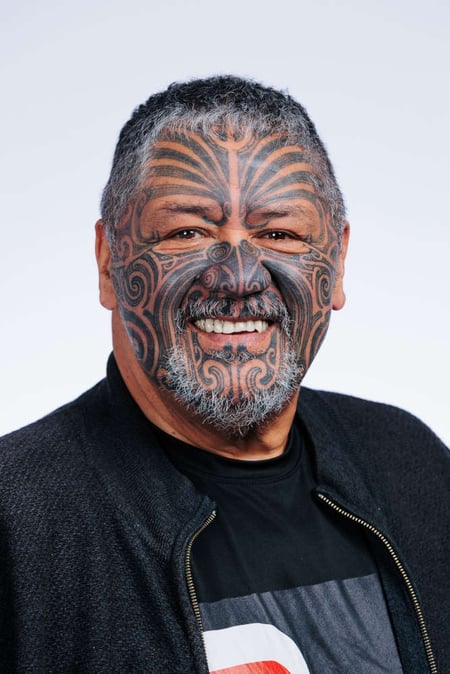OUR PRESENTATION
Abstract
The pūrākau of Mataora, tells the story of an ariki (high chief) who had believed he was not accountable to anybody. However, guided by the love he had for his wife, Niwareka, Mataora became a kaitiaki for changing attitudes, beliefs and behaviour; firstly his own and then actively influencing changes in those around him. The knowledge embedded in the pūrākau of Mataora underpins a uniquely transformative Indigenous approach to addressing inequity for Māori in Aotearoa (New Zealand). Drawing on interdisciplinary knowledge bases, including Kaupapa Māori critical theory and systems change theory, this chapter explores how Mahi a Atua (a philosophy guided by ancestral knowledge) deliberately prioritises the reinstatement and embedding of Indigenous knowledge systems as the foundation for an Indigenous consciousness-based approach to system transformation. Underpinned by three key principles, Mahi a Atua is deliberately positioned as a ‘way of being’ across personal and professional lives. Movements to critical consciousness; that is, transformed mental models on which new actions can be based, are facilitated via an ongoing process of critical self-reflection and assessment; and examining structural variables such as power, social justice and equity, as well as one’s own privilege and bias. System healing is integrated within our Indigenous systems change paradigm, with it becoming increasingly clear that individual, intergenerational and collective injuries exist as powerful forces across our systems today. Intentionally sitting within a wider Indigenous liberation movement, our approach focuses not only on what is required to shift the conditions sustaining institutional racism, but also on growing a collective leadership of Mataora (change agents) who are imagining and co-creating innovative Indigenous futures.

Dr Diana Kopua
Director/Independent Psychiatrist, Mahi a Atua
In 1990 Diana began her journey in the health industry, training first as a nurse and in 2014 she completed her specialist training in psychiatry and is a Fellow of the Royal Australia New Zealand College of Psychiatry In 2010 Diana was awarded the prestigious Ngarimu VC Manakura Award It is awarded to those who display characteristics of the 28 th Māori Battalion strength of character, ambition, courage and original thought Diana carried these characteristics to the Tairāwhiti in 2014 where she became the first Ngāti Porou psychiatrist.
Dr Diana Kopua is changing the system by preferencing Indigenous approaches to orangatanga As the developer of Mahi a Atua she and husband Tohunga Mark Kopua use Māori creation stories and pūrākau to transform mental health frameworks, providing an affirmation of our amazing genealogy and validation for our resilience Dr Di and Mark are teaching communities of practice an alternative to the Western model, using a culturally sensitive new therapy to address mental distress and suffering amongst Māori The Mahi a Atua approach has been utilised by multiple practitioners across various sectors within New Zealand society including art, health, education, justice and the social services sector Both Diana and Mark Kopua are committed to indigenising their respective communities of practice and are pioneers within their fields.

Tohunga Mark Kopua
Director/Amo Mātauranga, Mahi a Atua
Mark was raised in Mangatuna by his old people and is considered a historian by his East Coast tribes. He is renowned for his expertise as a master carver and spent 44 years in carving which includes completing 7 ancestral meeting houses. Mark has dedicated 31 years of working at the forefront of modern Moko (traditional Māori tattoo) and has trained several moko artists while still continuing to work as a moko artist and design consultant. Mark has been employed in many national and international roles. One unique role has been his involvement in Moko Ihorei (tattooed head) repatriation work and domestic and international provenance of traditional Māori carvings. For many years he was a board member of the national Māori art advocacy, Toi Māori Mark for 40 years has accepted the invitation to judge the regional kapahaka Tamararo and 13 years as a national judge for Matatini. He first began his journey in mental health services in 2012 as a cultural advisor/worker for a community Māori Mental Health Service, in Porirua. He is a confident facilitator and his approach to healing is celebrated by communities as he embraces his unique skills as a storyteller and keeper of ancient Māori knowledge and whakapapa. He held the position as Tohunga ( for Te Kūwatawata a groundbreaking Māori designed mainstream mental health service. Together with his wife Dr Diana Kopua, Mark has created Te Kurahuna a whare wānanga (training institute) where practitioners learn indigenous knowledge in a unique and authentic way.
